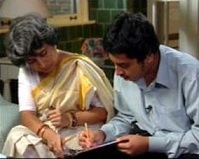Tito Mukhopadhyay: The Rosetta Stone of Autism

Much attention has been given to the accomplishments of individuals on the high-functioning end of the autism spectrum.
We hear of gifted savants such as Daniel Tammet or Kim Peek who defy imagination
with uncanny visual, mathematical or historical recollections and abilities.
However, in a category all his own is Tito Mukhopadhyay, a native of India who has been described as “the Rosetta
stone of autism." Despite being non-verbal and in need of constant care, Tito is able to describe and illustrate thoughts about the world he lives in with incredible detail and insightfulness.
Normal brain functioning is described as the combination of numerous processes and systems seamlessly working together. While neurotypical
individuals process sights and sounds immediately, current research indicates that this information is processed at different speeds in our brains, but so rapidly that they seem simultaneous to us.
Mukhopadhyay has described his world as a kaleidoscopic, where he is forced to select a single sense at a time in order to keep
a flood of visual and auditory senses at bay. These descriptions confirm recent theories
about autism and are helping scientists grasp the inner workings of the autistic brain.
Tito’s ability to share his amazing insight is in part due to the tenacious efforts of his mother,
Soma, who was undaunted by his heartbreaking diagnosis at the age of three and insisted upon teaching him to read and write. Untrained in autism, she dedicated herself to reaching her
son and single-handedly developed the Rapid Prompting Method for Autism, a
communication technique that she is generously sharing with others ( https://www.halo-soma.org
).
Simply put, she trained her son to focus, point and spell using an omnipresent writing
pad and later on through a keyboard. Tito has now evolved into a prolific and gifted author and poet, shocking the world with beautiful stories and poems he began writing between the ages of eight and eleven.
Now in his early twenties, Tito Mukhopadhyay has already written a book entitled “How Can I Talk If My Lips Don’t Move? Inside My Autistic Mind,” an unparalleled look into the heart and mind of a tortured, yet joyous soul. In it, Tito describes how his mind works and the ways he views the world and its neurotypical inhabitants. He also shares his unique perception of speaking stories to a mirror and then having the mirror speak the stories back to him as if it was an entity separate from himself and non simultaneous with his own speech.
Tito once wrote, “With the help of my imagination, I can go to places that do not exist and they are like beautiful
dreams. But it is a world full of improbability racing toward uncertainty.”
The improbable accomplishments of this remarkable young man bring hope to the uncertainty of living with
low-functioning autism. Everyone on the autism spectrum and their loved ones can take heart from this
soulful and accomplished young man.

